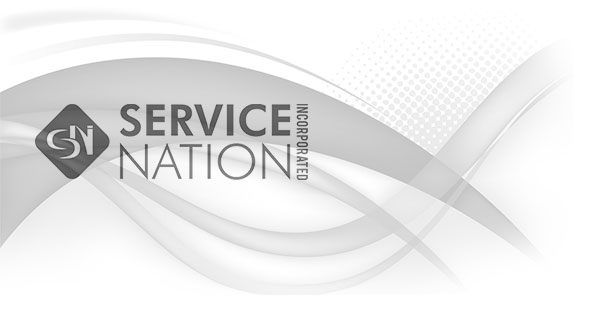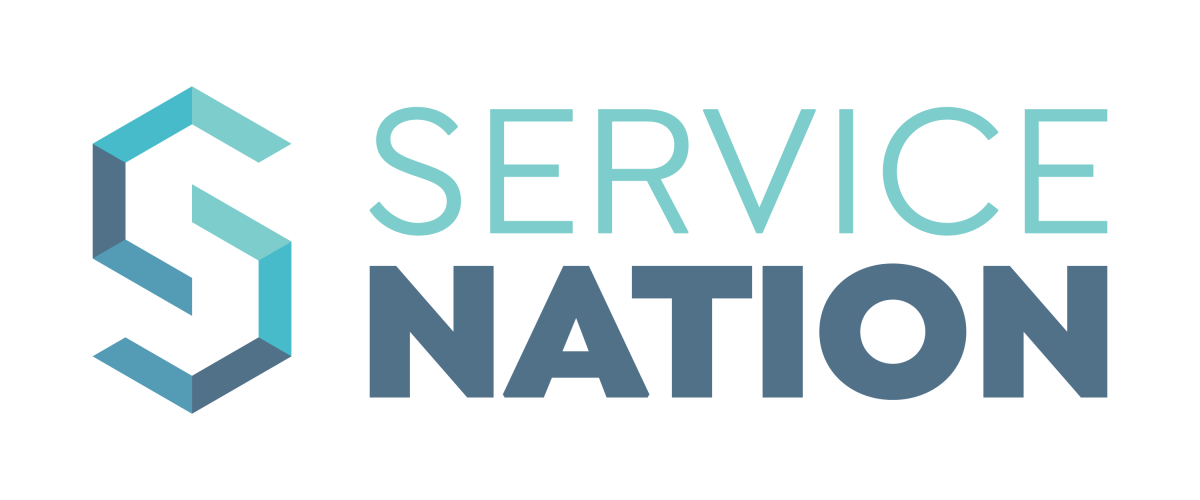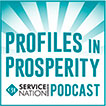David Heimer: So you must have had some thought about that. Because you had a successful career. You’re being very modest about it, but you had a very successful career. And at some point in time you were sitting there looking at the alternatives. I can work full-time in my career and help Delane out a little bit or I can do part-time both. Or I can just throw everything into Covenant Plumbing and do that. So how did you come about to that conclusion?
Lori Stickling: It’s been a long journey, but one of the things that working with Delane allowed me to do too, was to be home with my kids as they were younger. And then as they went to school, my role in the business kind of grew. But in the beginning, when I was still working and helping him, it was, working for the business, going to be a better long-term solution than going back to corporate America. And we bumbled along for years, but we had a moment that really was for us. And it actually was right before we came to that Service Day in Chicago where I met you and where we decided to join the SNA that made us look okay, you could go work for someone, they offered to do a job and I could go back to the workforce or, you know, back to my career, quote and quote. We looked at that and the cost and owning a business or whatever. You look at the value of owning your own business and what you earn from it and, and what you can benefit from it.
And then that was where I had to make the decision between, do I really want a career or is this gonna be my career? And I finally said, this is my career and I am going to make it happen here. And it truly, I have. Even just in the past three years, as we’ve delved into service. I have a passion for this industry. I love that we’re able to help people, we can make big impacts on our communities. Because that’s really where we’re reaching into. We’re not outside of it. We’re really in our community. And, I love the women in the trade aspect of it. There’s a big opportunity for women to become leaders here and we can make a big difference in caring for our customers and our employees.
David Heimer: So tell me a bit about Covenant Plumbing now.
Lori Stickling: Okay. Yeah. So Covenant Plumbing has seven employees. We have Delane and myself kind of leading, Kristen an office manager. She’s also our CSR and dispatcher. We have four plumbers out there running. We have three service trucks running in Bloomington, Normal Illinois, where our population here is about 175,000.
David Heimer: Very nice. So I really like the name Covenant Plumbing. How did that come about?
Lori Stickling: When we were starting our business, we really struggled to know if Covenant – It was kind of a partnership in the very beginning between Delane and a friend. And our friend really wanted to name it, Covenant Plumbing. I actually struggled with that, but the more we kind of searched God’s word and we prayed about it. We felt really led that that was what we were supposed to do. And it’s been a really good name for us. I feel like as we’ve been in business, it gives us some accountability. It has made us really stand strong on the fact that we’re gonna stand behind our product. We’re gonna keep our promises, we promise to be honest and operate with integrity. And so those are our core values. And it’s really keeping that name at the forefront that has made us really true to those values. It’s been a really good choice. We’re thankful that we decided not to stray away from having a name that maybe could be connotated with, spiritual or faith of any sort. And there were some people in the past that did say, it might not be a good idea to have something that treads on a line.
David Heimer: I mean, I think covenant is about promises. I think it has some religious connotations, but it also transcends that I think. And I like what you mentioned, I saw it on one of your web pages. It says Covenant Plumbing, we keep our promises. Pretty simple, beautiful tagline. Shows who you are and what you’re all about. I think that’s great. You have been working on your business quite a lot. You mentioned that a bit earlier. What changes have you made in the last year or so that have made a big difference for you?
Lori Stickling: Yeah, I feel like we’ve been drinking from the fire hose a little bit. But we have done a ton of work and as I step back even and think about what we’ve done in the past year, it’s pretty fun to see. One of the biggest things is I was always in our house in a home office ironically right before COVID hit. We had moved into a shop. That’s good and bad. That gave me the ability to hire an office manager and a dispatcher and work a lot more on our numbers. And I have learned so much about numbers and keeping our books better and really focusing on KPIs and tracking where we’re going and just been everything tight and communicating better with our technicians on numbers and goals. We started a twice-weekly training for our technicians. We’ve done some two to a truck for our plumbers.
We implemented a new service software. We used Service Titan. When we implemented that we had been using a different software package that helped a little. But when we went to Service Titan, our processes and some of the weaknesses and the areas we really needed to work on just became glaringly obvious. And we’ve really been working on processes and procedures and getting those kinds of things more organized. I’ve learned a lot about creating a real marketing plan. I always had some marketing plan, but we were just kind of winging it. So getting that in place and having a new website created, we’ve been working on some SEO and getting reviews. I think we’ve gotten in the past year, It’s about 105 star reviews, which has been awesome. But it’s just asking and learning how to do that process. We did some annual planning, which really helped us this year. We did that at the end of last year and we’re just working on that now.
And I think the biggest thing is that in July of this year I said goodbye to new construction plumbing entirely. That is the single biggest move that we’ve seen impact our business. But it was something where we had new construction plumbers, we started to move into service, but there wasn’t the service demand. And so just over the past year and a half, we’ve been building that, getting the phone touring more for service, establishing that. We’re here for service in the market and getting enough to have one van running consistently and then two, and we’re starting on that third van. So it’s really exciting to watch that. And then to see the difference in our numbers since July has been super great. So our labor percentages have been a little bit more on point. So you have your KPIs and we’re supposed to be at 20, 25% labor. Our materials we’re always at about 50% or so for new construction, we’re seeing them drop into the 20% range.
David Heimer: Beautiful.
Lori Stickling: And people, when we first started with Service Nation Alliance. People were always saying, we’re seeing 50%, 60% gross margin. And I was like, how in the world are they doing that? We couldn’t even fathom it. And last month for the first time we did hit a 50% gross margin. So it was October.
David Heimer: Nice.
Lori Stickling: Yes. And so it has been an amazing thing to watch. Everyone said do it, do it. And we were like, well, it’s a security, it’s solid, it’s year-round and we have some good builders. But we finally just cut that cord a little bit and it has been really great to watch the differences.
David Heimer: Yeah. And what I’ve heard from other people is they really like the cash flow and the consistency of cash flow with residential service as opposed to new construction.
Lori Stickling: Absolutely. We have seen with new construction, you could wait 60 to 90 days on an invoice to be paid. But we had already paid for all the materials and the labor that went into that. So you’re always – the bank. And with service plumbing, you can collect at the end of a service call. You have the money in the bank when it’s payroll when you have your taxes due. All of that, it’s sitting there because you got paid immediately. We can pay our suppliers. It’s great. I was always extending a line of credit and then paying that back and looking at your accounts receivable and saying, they’re getting out their ways and calling and you don’t have to do that. It’s less stressful.
David Heimer: Yeah. Cash flows better. And you spend a whole lot less time watching invoices, past due notices, all that stuff. Yeah. It’s nice. Absolutely. That’s the way business should be.
Lori Stickling: Yes.
David Heimer: How did the builders take it? Was it hard on them? Were they disappointed to see you leave? Was it good for you to say goodbye? What was that like?
Lori Stickling: There were a couple, it was all right to say goodbye. There was one builder that was really good to work with and he always paid fairly quickly. But we were able to kind of steer him towards a friendly competitor. But someone that we knew was in the industry that does new construction and wants to keep on doing it. And so he was happy to have someone else and we were happy to go. So we left Lee and it all worked.
David Heimer: So, looking out into the future, what do you see for your company? What do you wanna accomplish?
Lori Stickling: So I have a little story that kind of looks at our past. Actually, a few years ago, we were approached by some friends who operate an HVAC company. And we had actually reached out to them and said, “Hey, we want to ask you some questions about running your service business, you’re not a competitor.” And they were like, “well, hey, we want to ask you some questions about plumbing.” And then when we met with them, it turned out, they were looking to expand into plumbing and wanted to hire Delane as their plumbing manager. I was kind of in the wind in their consideration, but what we ended up kind of figuring out was that our business wasn’t worth much in their eyes. So we were like, okay, what do we want to do? And why are we not making the living that we should be making at this?
It was such a wake-up call to us that our business wasn’t of value. And so we really decided we wanted to do something about that. So ironically at the same time, probably a month later, we went to a Success Day in Chicago and we decided to join Service Nation Alliance. And since then we just had so many resources. I was always sitting and saying, how do other people do that? How do other people do this? And we have gotten a lot of resources and help with that. So that was the past that kind of spurred us on to where we are today. And what we want for the future is just knowing that we have a business that will provide for us in our retirements and in our future, that’s kind of the big thing. It was like we had something that was providing for us today, but it wasn’t worth anything. And so we want a business that will provide for us in the future and for the families of our employees. So building that.
David Heimer: I mean, that was a real turning point. It’s interesting because a lot of people, I think, kind of fall into that. But you actually had a point where you had really carefully evaluated it and thought about it. And the part about realizing that you didn’t have a business that was worth anything.
Lori Stickling: Yeah.
David Heimer: And the desire to change that, really is an interesting and insightful story.
Lori Stickling: I thought that it would be something useful to talk about. Because it’s like, we thought we had something. Seeing that someone else’s evaluation of it was sort of like calling your baby ugly. But it opened our eyes.
David Heimer: It was a lesson, right? Yes.
Lori Stickling: It was a wake-up call. We also want to really give back to our community. That’s been something we do a little, but as we grow and we see some profitability. The opportunity to just be a part of our community is super exciting for us and we’re kind of trying to make plans for next year about that. Then just to have a business that’s of value. We have a teenage son who indicates he’s interested in a future, in doing this. We have some expectations for him, obviously. And I hope to see him work in someone else’s business maybe or do some things. But if we can build a business that will be a legacy for him, I will see that as a success. And if at the end of the day, he’s not interested. I think then it’s a business that’s valuable for someone else to buy or whatever will happen in that case. But if we get a business or if we continue working on a business, that will be a value to him, it’ll be a value to someone else if he chooses not to go that route. So those are kind of our goals.
David Heimer: Makes perfect sense. Well, Lori, thank you so much. This has been terrific. I love hearing about what you guys are doing. I think the future is really bright for guys and I look forward to hearing more about the exciting things you’re doing in your business as you grow and become a bigger part of your community. I think it’s fabulous stuff. So congratulations to you guys. You’ve come a long way already, but I think you’re going to take it a whole lot farther too.
Lori Stickling: Thank you, David. We feel very thankful just to be a part of the Service Nation community and in the trades, and we’re excited to see where it takes us.
Outro: We’re always looking for good ideas and interviews for our podcasts. If you have an idea, or maybe you think you should be interviewed, just shoot an email to profilesinprosperity@serviceroundtable.com. That’s profilesinprosperity@serviceroundable.com. If you think what we’re doing has any value, it would be very helpful if you would give us a great rating on iTunes. Thanks for your support. Hope to see you again soon. Bye.





 (877) 807-0869
(877) 807-0869 Member Login
Member Login

